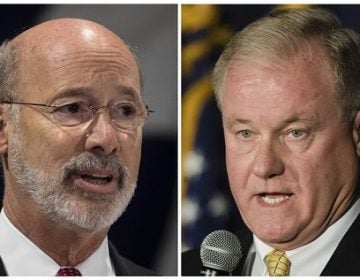Is Pennsylvania swarming with illegal voters?
We explore the claim that there are 100,000 illegal voters in the commonwealth.
Listen 2:50
Candidate Pennsylvania Sen. Scott Wagner, R-York County, takes part in the Montgomery County Republican Committee gubernatorial forum in Blue Bell, Pa., Thursday, Oct. 19, 2017. (AP Photo/Matt Rourke)
A Republican gubernatorial candidate in Pennsylvania, state Sen. Scott Wagner, recently sent supporters an alarming email, pointing out that the Washington Times has reported there are 100,000 noncitizens registered to vote in Pennsylvania.
Is that possible?
Maybe, maybe not. But the origin of the figure and how it found its way into the public debate is an interesting tale.
It turns out that, for nearly 20 years, Pennsylvania’s Department of Transportation’s system for issuing driver’s licenses all but encouraged non-citizens to register to vote — and then registered them.
When a noncitizen would go to get a driver’s license, he or she would show a green card or other documents making it clear he or she wasn’t a citizen.
Then, they would be directed to a touch screen that would ask if they’d like to register to vote. If they chose “yes,” figuring that it had to be OK, they would be registered.
This problem was highlighted last year by Philadelphia City Commissioner Al Schmidt.
“Certainly most people who did that did not go intentionally to PennDOT that day, setting out to commit voter fraud,” Schmidt told a state Senate panel in December.
That problem of PennDOT touch screens routinely offering voter registration to noncitizens was fixed last year.
But how many noncitizens are registered from all those years when they were misled into believing it was permitted?
Schmidt says there’s a way to check: Voter registration records include driver’s license numbers, and driver’s licenses of noncitizens have an INS indicator, for Immigration and Naturalization Service.
You can run a match between those two databases.
“It’s not a matter of guessing. It’s a direct match,” Schmidt said. “They’re unique numbers tied to those records.”
Schmidt said that officials of the Department of State, which oversees elections, told him and his staff in a meeting last summer that they ran that match and found over 100,000 hits.
That’s where the number comes from.
When Schmidt made that number public in an appearance before the legislature, it picked up steam in conservative media and inspired a lawsuit for Department of State records by the conservative Public Interest Legal Foundation.
Case closed?
Schmidt isn’t saying he’s sure 100,000 noncitizens are registered today. Some may have become citizens. Others may have left the country. Or maybe there’s some other explanation.
And Schmidt, a Republican, certainly doesn’t advocate a purge of those in the match from voter rolls.
But he does think the department should send letters to everyone in the match inquiring about their citizenship status and urging them to cancel their registration if they aren’t citizens.
Schmidt and others note that noncitizens in the country legally can jeopardize their chances of becoming citizens if they mistakenly register and vote.
That’s one reason that, since 2000, more than 1,100 noncitizens have voluntarily cancelled their voter registration, a number provided by the Department of State.
The mysterious match
But it’s puzzling that the Department of State simply won’t say whether it did the database match between voter and driver’s license records, as Schmidt says its staff reported. (At my request, Schmidt provided the date and names of participants in his meeting with state officials.)
“The department has retained an expert to conduct a full analysis of registration data, and it would be inappropriate for us to discuss the ongoing analysis at this time,” department spokeswoman Wanda Murren replied in an email to my question about the database comparison.
Department officials did say in a February statement to the Associated Press that that there is “no evidence” to support the 100,000-voter claim, and that the number “is not confirmed by any substantive analysis by the department.”
Another side
I made some calls to immigration activists and lawyers, and found them puzzled by and skeptical of the 100,000 noncitizen voters claim.
One activist suggested that the Department of State’s voter database is so backward and clunky that no one should trust the described match with driver’s license records without careful auditing.
If that’s true, you could imagine Department of State officials wouldn’t be anxious to offer an explanation.
Two immigration lawyers I spoke to said those in the immigrant community generally know they aren’t supposed to vote and make sure they don’t register so it won’t screw up their chances of becoming citizens.
Both knew of cases where noncitizens had mistakenly registered to vote at PennDOT offices, but not many.
“In 30 years, I’ve seen a handful of cases,” said immigration attorney Jon Landau. “I could imagine maybe a couple thousand (noncitizens registered to vote), not a hundred thousand.”
“I’ve been practicing for 10 years, exclusively in immigration, and I’ve seen it maybe twice,” said immigration lawyer Brennan Gian-Grasso, who also doubts the 100,000 figure.
A couple of other points bear mention, for context:
If there are 100,000 noncitizens registered to vote, it would amount to about 30 percent of the noncitizens of voting age living the state, according to Census Bureau estimates.
Also, I’ve seen no evidence that large numbers of noncitizens have actually voted.
The Department of State reports that the 1,160 noncitizens who cancelled their registration when they realized their mistake cast a total of 544 ballots since 2000, in elections in which more than 93 million votes were cast.
WHYY is your source for fact-based, in-depth journalism and information. As a nonprofit organization, we rely on financial support from readers like you. Please give today.





